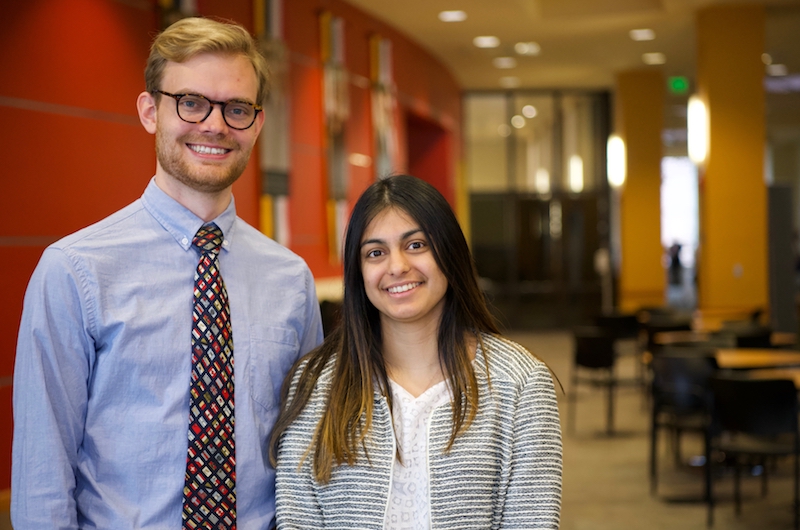UMB Regents Meeting Goes International
April 24, 2019 Christianna McCausland
Two third-year students benefit from UMB’s Center for Global Education Initiatives, which funds interprofessional teams of faculty and students taking part in overseas projects.
When University of Maryland, Baltimore (UMB) President Jay A. Perman, MD, speaks in public, UMB students are often his chosen subject. So it was no surprise when UMB hosted the University System of Maryland’s quarterly meeting on April 19 that Perman told the regents about two students who then shared their personal experiences of learning abroad.
“UMB has been engaged globally for many decades, with research, clinical care, and service collaborations that have saved — without hyperbole — millions of lives,” Perman told the breakfast gathering at the SMC Campus Center. “We have deep capacity at UMB to influence health, well-being, and justice on the global stage, and more of our students must be able to access international opportunities not only to improve the human condition, but to develop their global engagement and global competency.”
Two people who have done just this are Suhani Chitalia and Michael Sikorski, third-year students at the Francis King Carey School of Law and the School of Medicine, respectively. Both benefited from UMB’s Center for Global Education Initiatives, which offers a grant program to fund interprofessional teams of faculty and students taking part in overseas projects.
Chitalia spent two months in Malawi last summer, working with students at that African country’s only law school. The opportunity was particularly germane for Chitalia.
“During my time in Malawi I was able to work on legal issues that I really cared about, including environmental justice, water law, and social justice issues,” Chitalia told the regents. She detailed a poignant site visit to Lake Chilwa, where the community relies on the waterway for its survival, yet it is over-fished. From site visits like these, the students researched legal avenues to improve policies impacting communities.
“I looked heavily into zoning issues, socioeconomic distribution and disparities in regions, and where environmental risks were present,” she continued.
Sikorski’s experiences are even more widespread. A one-time Fulbright Scholar currently enrolled in the joint MD/PhD program in molecular microbiology and immunology, he has thrice traveled to Santiago, Chile, and worked in Samoa in the South Pacific. He explained that his interest in international education was sparked during an undergraduate semester abroad in Madrid, Spain, while a student at the University of Maryland, College Park.
At UMB, he connected with Myron Levine, MD, DTPH, the founding director at the Center for Vaccine Development and Global Health (CVD). Sikorski was able to join a two-year typhoid study in Chile designing a web-based data capture system. Through the CVD, he gained an additional opportunity to generate heat maps of typhoid cases in Samoa. These projects took him out of his “comfort zone,” he admitted to the regents, both in terms of the locations and the skills he needed to acquire to complete the work, but he explained that with each experience he grew personally and professionally.
“Every time I return to Baltimore from one of these whirlwind field visits, I find myself with a greater sense of self-confidence, a better understanding of interdisciplinary frameworks, and a deep appreciation for and avid interest in learning about the cultures and unique perspectives of my colleagues with backgrounds different from my own.”
Perman underscored that these global projects are not only for the enrichment of students and the overseas communities they serve, but they also inform work done here at home: “Students and faculty will tell me how they are taking a lesson they learned abroad and applying it to an intractable problem here at home.”
This important work continues to grow — in May, UMB will host a Global Health Summit.